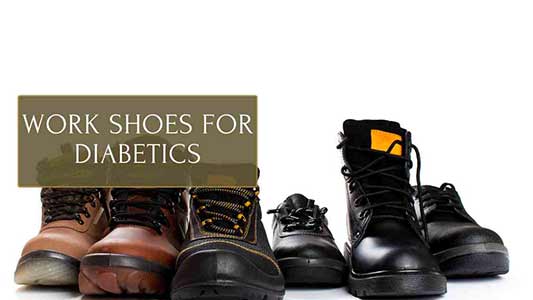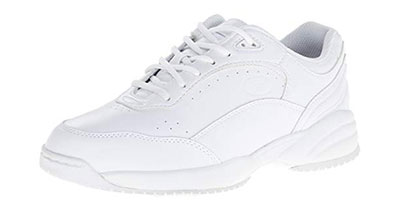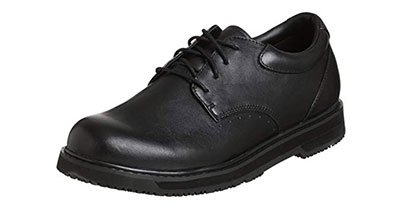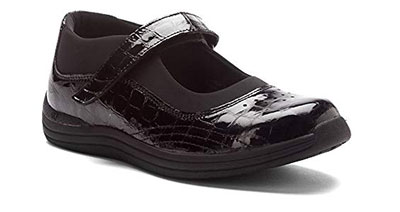People with diabetes are prone to various foot ulcers and infections, which are hard to heal and cause serious complications. This is attributed to nerve damage, which leads to loss of feeling in the feet. If you have nerve damage, you are less likely to feel pain due to foot injury. In addition, ulcers can develop if you are wearing uncomfortable shoes. This makes it necessary to have the Best Work Shoes for Diabetics to prevent foot injuries.
If you are a diabetic chef or nurse and looking for work boots, make sure you buy a slip-resistant, reliable pair of boots. Various diabetic slip-resistant shoes are approved for the Diabetic Medicare code. However, there are some more essential features that you need to look for when shopping for work footwear.
Contents
- Features Of The Best Work Shoes for Diabetics
- 3 Best Work Shoes for Diabetics – Reviews
- Foot Care and Maintenance
- FAQs for Work Shoes for Diabetics
- What features should I look for in work shoes if I have diabetes?
- Are there special work shoes for people with diabetes, or can I wear regular ones?
- Can I wear orthotics or custom insoles with work shoes for people with diabetes?
- How should work shoes for people with diabetes fit?
- Are there any work shoe brands recommended for people with diabetes?
- How do maintain work shoes for people with diabetes?
- Bottom Line
Features Of The Best Work Shoes for Diabetics
Diabetes can cause serious foot issues, including neuropathy and poor circulation, that require the right footwear to ensure comfort and safety. For individuals with diabetes who must stand or walk for long periods, choosing the best work shoes is crucial to maintaining foot health and avoiding injuries. Here are some of the features that make work shoes ideal for people with diabetes:
Comfortability:
The comfort of work shoes is essential for people with diabetes. Shoes should come in various sizes and widths and provide adequate cushioning to reduce pressure points and shock absorption to protect the feet.
Breathable Materials:
Work shoes made from breathable materials allow air to circulate, which reduces sweat and moisture build-up. Moisture can cause fungal and bacterial infections, particularly in individuals with diabetes. Thus breathable materials help keep feet dry and avoid bacterial and fungal infections.
Removable Insoles:
Work shoes with removable insoles allow custom orthotics that serve your unique foot needs, which can prevent calluses, improve circulation and relieve pressure on different parts of the foot.
Non-Slip Soles:
Good work shoes for people with diabetes provide excellent traction and reduce the risk of accidents or falls, especially when working on slippery surfaces.
Excellent Arch Support:
Work shoes with proper arch support increase stability and reduce foot strain. People with diabetes need proper arch support to decrease foot fatigue and increase balance and stability.
Roomy Toe Boxes:
Diabetes causes foot swelling, including on different parts of the foot. Therefore, getting shoes with big toe boxes has more room for toes to move and prevent irritation that could harm the feet.
3 Best Work Shoes for Diabetics – Reviews
1. Propet Women’s Suregrip Walking Shoe
This is one of the best shoe options for diabetic women. The Propet Nancy sneaker is designed for people with diabetes and is approved for Medicare code A5500. The shoe is made of genuine leather which makes it breathable. It has firm heel counters that come with some padded collars, which help to reduce fatigue. It is a lace-up closure, allowing you to adjust the fit.
The shoe is gel-cushioned, and it has a removable insole that helps absorb shock to keep you comfortable all day. It comes with a unique rubber outsole that offers slip resistance for wet and greasy. This shoe has a breathable lining made of fabric to keep your feet moisture-free.
2. Propet Men’s MSR003 Maxigrip Slip-Resistant Shoe
Propet is becoming one of the leading shoe companies. The company specializes in walking shoes that are designed with diabetics in mind. The Propet Maxigrip slip-resistant shoe for men is a good example. This shoe is ideal if you have diabetes and are looking for a comfortable, slip-resistant shoe for work. In addition, its outsole is designed to offer traction and high grip.
This is a sturdy shoe that is also durable, making it ideal for everyday use. It comes with Maxigrip Walkers that provide superior support. The shoes are supportive and have deep and wide-toe box shoes. In addition, it is a lace-closure shoe, which offers you a snug fit.
The Propet Maxigrip slip-resistant shoe (if you like to wear flat slip-on shoes) does not compromise on style, and you can wear it with both formal and casual outfits. It is only available in black, which makes it ideal for work. Its upper is made of supple perforated leather. Your feet will remain calm through the day when you have these shoes on. In addition, it comes with a breathable leather lining that helps to prevent moisture buildup. People with diabetes are advised to keep their feet dry to avoid infections and ulcers.
It comes with a detachable insole that has cushion gel to ensure you are comfortable all day long. The shoe has external and internal heel counters designed to reduce foot fatigue. This is important, especially when you have to wear the shoes for several hours. It also comes with a padded collar for additional comfort. Its rubber outsole helps to absorb shock and offers a reliable grip.
3. Drew Shoe Women’s Rose Mary Jane
These Mary Jane therapeutic Drew shoes for women are approved for the Medicare code. They offer double depth with two removable insoles for a custom fit. Those shoes are orthotic-friendly. Drew shoes are lightweight and slip-resistant to water but not oil. They come with extra padding and offer excellent arch support and stability. They are also odor resistant.
Foot Care and Maintenance
People with diabetes require proper foot care to avoid complications due to poor circulation and nerve damage. In addition, proper care and maintenance of work shoes can extend their lifespan and provide continued support and comfort for the diabetic wearer. This section will review foot care tips for diabetics and shoe care and maintenance for work shoes.
Proper foot care for people with diabetes:
- Daily foot checks: Inspect your feet daily for any cuts, swelling, blisters, or sores.
- Keep feet clean and dry: Wash your feet with mild soap and water, and dry them thoroughly, including between the toes.
- Moisturize: Use lotion to prevent dry skin and cracking, but avoid applying lotion between the toes.
- Wear appropriate socks: Avoid tight socks that can restrict circulation. Choose soft, breathable socks that fit well and wick moisture away from the feet.
- Trim toenails carefully: Cut nails straight across and avoid cutting them too short or into corners.
- Protect your feet: Avoid walking barefoot. Wear shoes and socks at all times to protect your feet from injury.
- Manage blood sugar levels: Keep your blood sugar levels balanced to help prevent nerve damage.
Shoe care and maintenance for work shoes:
- Rotate shoes: Alternate between two pairs of work shoes to give them time to dry out and assist in preventing bacteria accumulation.
- Clean shoes regularly: Wipe down the shoes’ exterior with a damp cloth to keep them looking clean and new.
- Remove insoles: Take them out and air them out after wearing them. Replace insoles if they are worn out or flattened.
- Check for wear and tear: Inspect your work shoes regularly for signs of wear or damage.
- Replace when necessary: If your work shoes show significant wear or no longer provide support and comfort, it’s time to replace them.
By following proper foot care practices and taking care of your work shoes, people with diabetes can prevent foot complications and enjoy optimal comfort and support while on the job.
FAQs for Work Shoes for Diabetics
Here are some frequently asked questions (FAQs) about work shoes for people with diabetes with their answers:
What features should I look for in work shoes if I have diabetes?
Work shoes for diabetics should have the following features- Arch Support, Wide Toe Box, Cushioned Insole, Non-Slip Outsole, and Breathable Material.
Are there special work shoes for people with diabetes, or can I wear regular ones?
Diabetic workers should wear special work shoes as these offer more support, comfort, and protection according to their needs.
Can I wear orthotics or custom insoles with work shoes for people with diabetes?
Yes, custom insoles and orthotics can be used with work shoes for people with diabetes to improve the fit and support of the shoes.
How should work shoes for people with diabetes fit?
Proper fit is important for work shoes for people with diabetes. They should be roomy enough to accommodate any foot swelling that may occur over the day but not so loose that the foot slides around inside the shoe, which can cause blisters.
Are there any work shoe brands recommended for people with diabetes?
Yes, many brands design work shoes specifically for people with diabetes. Some recommended brands include New Balance, Brooks, and Orthofeet.
How do maintain work shoes for people with diabetes?
Work shoes should be cleaned regularly and inspected for wear and tear. The insoles can be removed to air out, and any custom modifications should be checked periodically. If shoes become worn out or damaged, they should be replaced promptly.
Bottom Line
If you need diabetic slip-resistant shoes for work, try Propet Nancy Diabetic Work Shoe for women and Propet Suregrip shoes for men.




